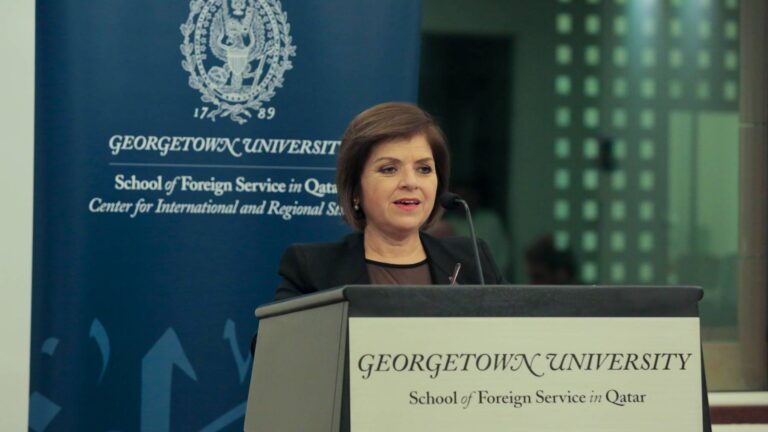Dialogue Series, Regional Studies
The Negotiating Process and Recent Developments in Cyprus

H.E. Emine Çolak, Minister of Foreign Affairs of Northern Cyprus, delivered a CIRS Focused Discussion on February 2, 2016, titled “The Negotiating Process and Recent Developments in Cyprus.” The talk shed light on the promising political developments in Cyprus between the Turkish Cypriot and Greek Cypriot people.
After decades of prolonged negotiations, H.E. Çolak said, the impasse on the island was expected to be relieved in 2004 with the United Nations (UN) Comprehensive Settlement Plan. However, it received 65 percent approval from the Turkish Cypriot people and was rejected by 76 percent of the Greek Cypriot people. Since then, there has been some progress, resulting in a Joint Declaration on February 11, 2014, which would enable the two sides to endorse their objectives for the formation of a bi-zonal, bi-communal federation based on political equality, and headed by a single sovereignty stemming equally from the Turkish Cypriots and Greek Cypriots.
The negotiations resumed more auspiciously following the election of His Excellency Mr. Mustafa Akıncı as the new Turkish Cypriot President. With the presence of the UN Special Adviser, Espen Barth Eid, on May 15, 2015, the two leaders, Akıncı and Anastasiades, expressed their interest and strong commitment to proceed towards a comprehensive settlement in a constructive fashion. Included in these agreements is the desire by the two parties to work on confidence building measures to ameliorate the living standards of the two communities. Discussing the outcome of this new process, H.E. Çolak summarized the five confidence building measures pursued by the two sides as “the opening of more crossing points between the two sides; interconnecting electricity grids; mobile telephone interoperability; prevention of radio frequency interferences; and establishing a committee on gender equality.” After substantive negotiations revealed that convergences on legislative and judicial affairs are consistent with the political equality of the two peoples, negotiations after November 2015 entered a more intensified stage with property at the center of the discussions. Agreeing on the categories of property, the parties decided to pursue the issues of territory, security, and guarantees at the end of the process.
Maintaining its commitment to the result-oriented principles of the 2014 Joint Declaration, the Turkish Cypriot side is optimistic about the prospects of reaching an agreement within months, not years. In the context of achieving that goal, H.E. Çolak also stressed the role of the EU, Greece, and the international community in supporting and defending the negotiations in order to ensure productive engagement from both sides of the island. She also added that it was necessary for the Turkish Cypriot side to be heard on all international platforms to further facilitate the process.
The reality of the situation, however, reveals the subjection of the Turkish Cypriot people to restrictions that have denied them basic human rights. From representation in international mediums to trade and tourism, the constraints imposed on Northern Cyprus for over five decades have proved to be a hindrance to the country’s cultural, academic, and sporting relations with the rest of the world. On this note, H.E. Çolak referenced UN Security Council reports in which both the then Secretary-General Mr. Kofi Annan, and the Secretary-General Mr. Ban Ki-moon, urged the international community to collaborate bilaterally to eradicate the restraints that isolate and obstruct the progress of the Turkish Cypriots. In addition to the support expressed by the UN, she reflected on the declaration of the Organisation of Islamic Cooperation (OIC) “to fully cooperate with and put an end to the isolation of the Turkish Cypriot people by calling upon the Member States to strengthen effective solidarity with the Muslim Turkish people of Cyprus and to help the Turkish Cypriots to overcome the inhuman isolations imposed upon them by increasing and expanding relations in all fields.”
In conclusion, H.E. Çolak condemned the unwarranted state of isolation that continues to preclude the Turkish Cypriot people from exercising their basic human rights as enshrined in the Universal Declaration of Human Rights. This, she said, is a blatant violation of the UN Charter and had no justification. She concluded her speech by reiterating the resolutions and declarations of the UN and OIC and acknowledging the positive impact that the lifting of the isolation would have on settlement efforts.